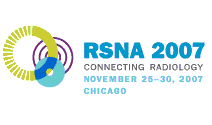
Abstract Archives of the RSNA, 2007
SSG22-04
In Vivo Therapeutic Efficacy of 213Bi (Alpha Particle Emitter) Anti-CD20 Monoclonal Antibody in Disseminated B-Cell Lymphoma: Assessment in a Highly Aggressive SCID Mouse Model with Sequential Bioluminescent Imaging
Scientific Papers
Presented on November 27, 2007
Presented as part of SSG22: Radiation Oncology and Radiobiology (Lymphoma/Sarcoma)
Nirav S. Kapadia, Presenter: Nothing to Disclose
Shingo Baba MD, PhD, Abstract Co-Author: Nothing to Disclose
Hong Song PhD, Abstract Co-Author: Nothing to Disclose
Richard L. Wahl MD, Abstract Co-Author: Research grant, General Electric Company
Speaker, General Electric Company
Speaker, GlaxoSmithKline plc
License agreement, GlaxoSmithKline plc
License agreement, Biogen Idec Inc
Scientific Advisor, Cellectar, LLC
Scientific Advisor, Actinium Pharmaceuticals, Inc
Consultant, Cellectar, LLC
Consultant, Nihon Medi-Physics Co, Ltd
Stockholder, Threshold Pharmaceuticals, Inc
Speaker, PETNET Solutions
To determine the efficacy and kinetics of response to a single dose of 213Bi-labeled anti-CD20 Mab in a newly developed disseminated model of B-cell lymphoma whereby an optical reporter gene allows in vivo tracking of tumor growth.
Ten SCID mice were dosed i.v. with 2x10^6 CD-20+ Raji lymphoma cells expressing luciferase. Tumor growth was monitored daily with an in vivo bioluminescent imaging system (IVUS). When the tumors reached the exponential phase of growth, one group of mice (n=3) was treated i.v. with approximately 35uCi of 213Bi-labeled anti-CD20 per mouse, a second group (n=3) received a similar i.v. dose of unlabeled anti-CD20 (4ug/mouse), and the remainder were given no treatment. Tumor response was monitored for 10 days after treatment.
Bioluminescent images showed progressive systemic dissemination of tumor cells with exponential growth 7 days after tumor cell injection. After day seven, tumor burden continued to grow exponentially in both the control and unlabeled antibody groups (exponential coefficients of growth were 0.5014 and 0.4364, respectively). In the experimental group, a significant arrest in tumor growth was observed for four days after treatment administration, at which point exponential growth resumed at a slower rate (0.2438).
Average tumor burden among control mice at 18 days post administration, when compared to tumor burden at 2 days post administration, was 1.5x10^3. Among mice treated with unlabeled anti-CD20, the ratio was 788 (p=0.146, compared to controls). In mice receiving 213Bi-labeled anti-CD20, the ratio observed was 52 (p=0.014 compared to controls, p=0.016 compared to the group receiving unlabeled anti-CD20).
By using a highly sensitive in vivo imaging system, we determined that i.v. administration of 30-35uCi/mouse of 213Bi-labeled antibody arrested tumor growth for nearly four days. Furthermore, ten days after treatment with this agent, a statistically significant reduction of tumor burden was observed when treated mice were compared to appropriate controls.
Alpha-emitting radionuclides such as 213Bi represent a highly lethal and specific tool for treating micrometastatic disease in this animal model.
Kapadia, N,
Baba, S,
Song, H,
Wahl, R,
In Vivo Therapeutic Efficacy of 213Bi (Alpha Particle Emitter) Anti-CD20 Monoclonal Antibody in Disseminated B-Cell Lymphoma: Assessment in a Highly Aggressive SCID Mouse Model with Sequential Bioluminescent Imaging. Radiological Society of North America 2007 Scientific Assembly and Annual Meeting, November 25 - November 30, 2007 ,Chicago IL.
http://archive.rsna.org/2007/5013268.html

